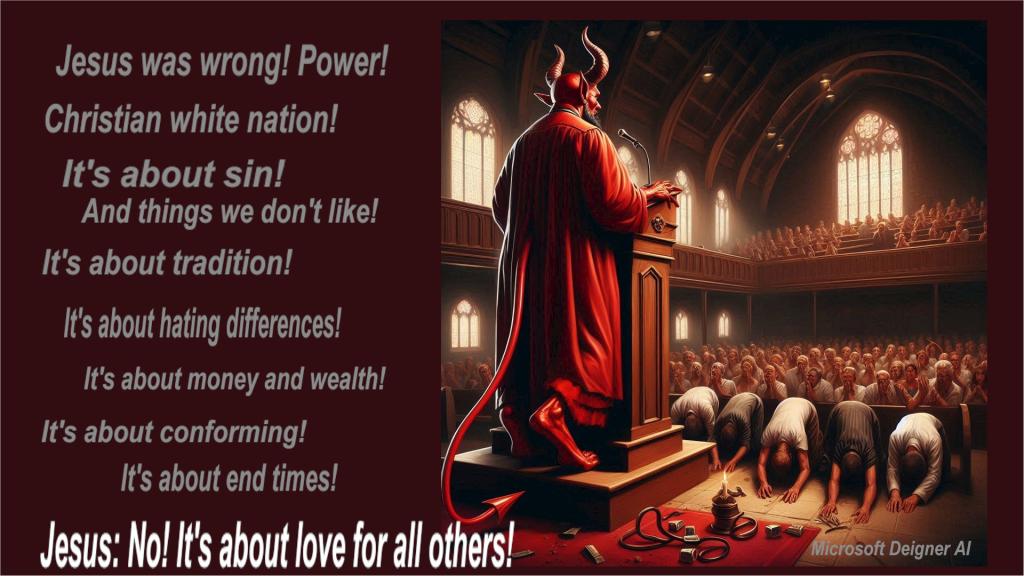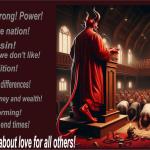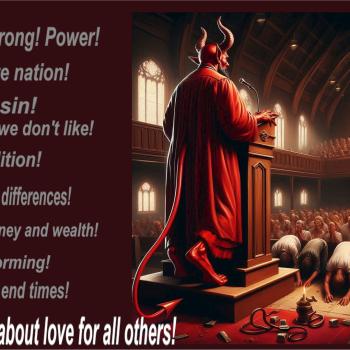Gen Z vs. Corporate Christianity: A Battle for Authenticity. Part 3 of 6
Is it true that nothing moves without money or political might? Or are we overlooking the true engines of change?
For reference, in my new book, Unleash Movements that Matter: Break Through Barriers to Change, I explore how transformative change often originates from individual actions, not established power structures. Think Rosa Parks, whose refusal to yield her bus seat ignited a movement. Jesus, too, began without worldly influence, his message of love challenging the very foundations of the Temple’s authority.
Podcast show links with added content: Substack, YouTube video, Spotify, and Apple podcasts. These appear a day after blog-article posts.

Individual actions spark movements that usurp power and money. This grows into organization and creates powerful change. Jesus was one of these individuals. He was heralded into the world as a baby with financially poor parents. Babies don’t have money, influence, or power. Jesus began teaching people how to live as God would have us live, loving others.
Jesus’s message resonated deeply with the people, ultimately undermining the authority of the Temple elite. Similarly, today’s generations are rejecting injustice and hypocrisy, wielding their collective voice to demand change from Christian leaders and the governemnt. Yet, powerful entities often seek to preserve the status quo, even attempting to reverse progress. Throughout history, the very powerful voice of religion has been manipulated for personal gain, distorting its original purpose.
Truth remains our most potent weapon. Jesus’s authenticity drew followers then, and it resonates with younger generations now, who readily discern the distortions of modern Christianity. This pursuit of power and wealth within religious institutions, exemplified by the rise of ‘corporate Christianity,’ prioritizes political influence over genuine charity.
Ref. verses
Jesus said:
“No one can serve two masters; for either he will hate the one and love the other, or he will be devoted to one and despise the other. You cannot serve God and wealth. – Matthew 6:24
“For the love of money is a root of all sorts of evil, and some by longing for it have wandered away from the faith and pierced themselves with many griefs.” – 1 Timothy 6:10
“And a second is like it: ‘You shall love your neighbor as yourself.’ On these two commandments hang all the Law and the Prophets.” – Matthew 22:39
“Jesus answered them, ‘Beware that no one leads you astray.’”- Matthew 24:4
Hijacking for power and money: The Judas Iscariot betrayal
Throughout history, the pursuit of power and wealth has often intersected with religious institutions, sometimes with detrimental consequences. A prime example of this can be seen in the rise of what some scholars term “corporate Christianity.” Corporate Christianity has more of a political religious influence rather than a love others “charity” influence.
the 1930s saw a deliberate effort by government officials, pastors, and business leaders to promote capitalism from church pulpits, as documented in Kevin Kruse’s book, One Nation Under God.
From the influence they promoted came the “Protestant work ethic” that leads to stress, headaches, back pain, and fatigue, increases the risk of heart attacks, high blood pressure, diabetes, irritability, anxiety, depression, a lack of balance between work and other aspects of life, and feelings of a constant need to feel productive, which can lead to guilt and anxiety. This relentless focus on work has had a demonstrably negative impact on the well-being of many Americans.
Ironically, other market-based democracies, with more holidays and shorter workweeks, demonstrate higher productivity than the U.S., which ranks 37th. Similarly, the U.S. lags in happiness, ranking 23rd.
These statistics reveal a society prioritizing work over well-being, often benefiting a select few. Generation Z has realized this and is less likely to engage, preferring to be consultants or entrepreneurs.
Furthermore, events like the National Prayer Breakfast have served as platforms for fundamentalist agendas, blurring the lines between religious belief and political influence. Ultimately, the pursuit of power can distort the church’s core message: love and service to others.
Furthermore, the National Prayer Breakfast, a religious meeting with the White House, congressmen, and others, has often been a front for fundamentalist Christian dogma with a narrower focus. This further illustrates the intertwining of religious beliefs with political and economic agendas.
Ultimately, the powerful design to line things up in their favor, even if it means distorting the message of the church.
While making money isn’t inherently wrong, it can lead to captivating misdirection that isn’t the central message of the church. Love of others following the Way Jesus showed us to live is the message, the Good News.
What can churches do?
Churches today find themselves at a crossroads, facing a critical decision. Will they go in the direction of corporatism, and ignore the injustices in our society in favor of money hoarding? Will the wealthiest country in the world adopt the slogan, “Make the US rich?” No end in sight.
Or will the world turn its focus toward making this a better world for everyone, easing the yoke of “never enough,” and favoring the individual and eliminating injustice?
Mainline Christianity, often distinguished from others by its support of the LGBTQ+ community, and women in ministry, takes a prominent role in social justice issues. Their voice is heard against the cacophony of strident voices opposed to social justice, whose religion is only about themselves.
New generations, which are spiritual and searching for meaningful religious support, can’t accept the attitudes of fundamentalist and evangelical churches, which it sees as unjust. This disconnect between traditional church teachings and the values of younger generations is a significant factor in the future of Christianity.
The strength of the future of Christianity lies in new generations, who are activists who won’t take no for an answer about injustice. They create change. Their commitment to justice and equality offers a powerful counterpoint to those who don’t support social justice within the church.
Therefore, churches can stand strong about their beliefs, about their truth, about the truth taught by Jesus. Eventually, the truth will win out. Eventually, new generations will replace all those trying to maintain the status quo or drag us backward.
Ultimately, the path forward is clear. Stay true to the mission. Love God. God is love, which is charity and mercy to all. Bring people into the spiritual kingdom. Be kind to each other. This is the law and the prophets, and the new law of Jesus, and covers all human conduct. This message of love and inclusion should be the guiding principle for all Christian churches.
Conclusion
Christianity is not about money and power. It’s about acquainting people with the way to live, as demonstrated by Jesus, so they enter the “spiritual domain” [kingdom] of God that is here, now, and is spiritual not physical. It’s about love, which encompasses all human action and activity.
“Outrage (righteous wrath) can be good if it compels us to positive action but not to hate.”
– Dorian Scott Cole
“With hate, we have more to lose than gain – break the cycle” – Dorian Scott Cole
Probability Space
What probability spaces can we open in our minds to demonstrate the love of God and our own love of others, to help the world be a better place for all, so that people want to follow the Way Jesus showed us to live?
(A probability space is where all of the elements necessary for something to happen are present and it’s almost inevitable. All it takes is intention.)
Potential Space
If you think creatively and allow your mind to wander and explore, how can we reflect the love of God for all, and our own love for all, through our government?
(A potential space is a virtual space in our minds where entirely new things can take shape.) More: Is Music A Form Of Prayer?
Would love to hear your thoughts in the comments below. This helps me improve my work.
Please subscribe to my Patheos Newsletter.
Below is information for church planning to minister to new generations, building a community of action, service opportunities, education opportunities for new generations, and descriptions of the author’s nonfiction books.
My new book
My new book, Unleash Movements that Matter: Break Through Barriers to Change, which I wrote for new generations, I research and explain in great detail what it takes to create change in our world. (An audio presentation is in progress.)
________________________
– Dorian
Our answer is God. God’s answer is us. Together we make the world better.
Restore and recreate. Take time to celebrate life. Laugh, sing, and dance regularly, even every day. Happy. This is why we dance to celebrate life: Reindeer actually running and dancing.
Building a Community of Action
New Way Forward community
Can we make positive change in our world and end a lot of suffering?
Helen Keller, who was both blind and deaf, said: “Although the world is full of suffering, it’s also full of the overcoming of it.”
The human spirit yearns for a world without suffering, but it’s through facing challenges that we progress. The world isn’t perfect, but together we can create a future with less hardship. Famine, discrimination, gun violence, and injurious economic and educational disparities are complex problems, yet understanding their root causes empowers us to find solutions.
Launching in first quarter 2025, the New Way Forward community will connect individuals seeking practical solutions and creating lasting change. We’ll focus on understanding problems and their solutions, and how to effectively create change.
Join us in building a brighter tomorrow! New Way Forward on Facebook.
Civic service opportunities
Do Unto Others Kindness Campaign, and civic engagement.
United Methodist Church Volunteer Opportunities.
Join or support Zero Hour and amplify the voices of youth organizing for climate action.
Peoples Hub. Resistance, Resilience, Restoration, Re-imagination. Online Popular Education. For movement workers to learn, connect, collaborate, and strategize – in and across the disability justice and solidarity economy movements.
Stakeholder Capitalism – a video podcast series from the World Economic Forum. Can capitalism be made to work for all of us – and to improve rather than destroy the state of the planet?
General service and aid opportunities (on One Spirit Resources Website). To add your service opportunity to the One Spirit Resources list, contact the author (me) through Facebook Messenger. Note that I only friend people I know.
————————————–
Education Opportunities for new generations
Becoming an Entrepreneur – MITx online
Evaluating Social Programs – MITx online
_______________________
Bible scripture verses are New American Standard Version (NASB), unless noted.
_______________________
Author and books
Appease the Volcano: What does God require from people? The voices of the ancients from many religions echo much of the same things: It starts with law, then mercy and forgiveness, then love. Love is a major emphasis in all major religions and replaces law.
The Prophetic Pattern: Ancient and Modern Prophecy: How to distinguish the intent of various types of prophecies and oracles, both ancient and modern.
Preparing For the Future Of Work and Education: Analysis of the kinds of jobs that AI and Robotics will displace, and the educational requirements for them. AI will replace or augment thirty percent of jobs. This is an in-depth analysis citing many authoritative sources.
Author Website: Dorian Scott Cole

















